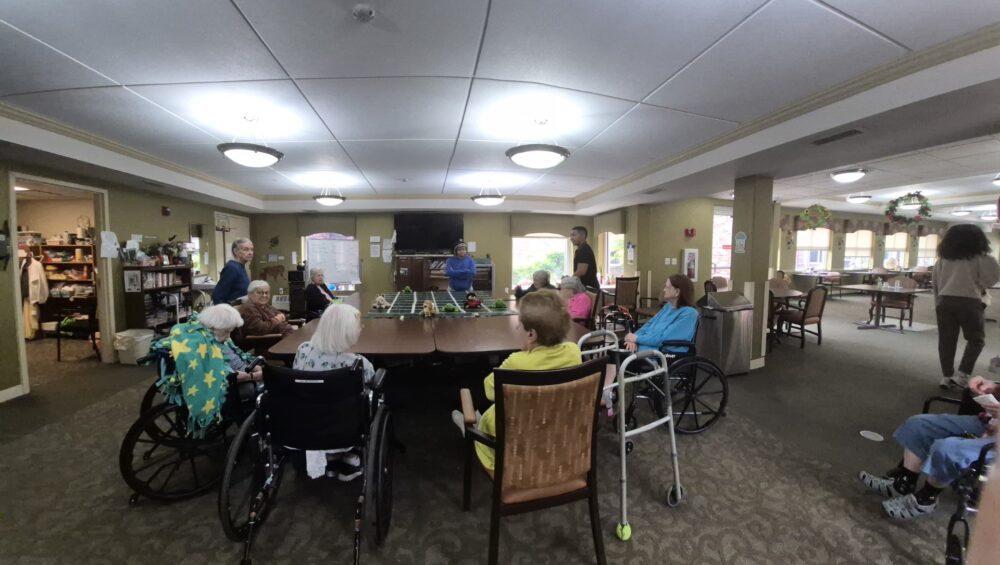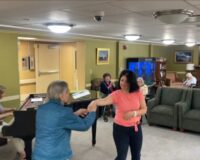Keeping the Mind and Spirit Active at Any Age
Games are far more than just entertainment. For seniors in assisted living, they can be powerful tools for enhancing mental sharpness, physical coordination, emotional well-being, and social connection. Whether it’s a rousing game of bingo, a quiet puzzle session, or a lively card tournament, games can transform daily routines into moments of joy, stimulation, and camaraderie. At communities like Manoogian Manor, games are a regular and important part of residents’ lives, offering countless benefits that support holistic senior care.
As we age, staying mentally and physically active becomes essential. Games provide structured yet flexible ways to engage seniors of all abilities, offering both familiar routines and new challenges. Let’s explore seven specific ways that games support well-being for those in assisted living settings.
-
-
Games Stimulate Cognitive Function
-
Cognitive engagement is vital for seniors, and games offer a natural and enjoyable way to keep the mind active. Word games, trivia, Sudoku, and puzzles challenge memory, reasoning, and focus. Even classic board games like Scrabble or chess require strategic thinking and problem-solving.
For seniors living in assisted living communities, regularly participating in brain-stimulating games has been shown to help slow cognitive decline and improve short-term memory. Staff at places like Manoogian Manor often incorporate cognitive games into daily or weekly schedules to keep residents engaged and mentally sharp.
-
-
Games Enhance Social Interaction
-
Isolation can be a serious concern for seniors, especially those who may no longer have access to their traditional social networks. Group games, like bingo, bridge, or dominoes, offer built-in socialization opportunities. These games naturally foster conversation, laughter, and even a little friendly competition.
In assisted living settings, games help break the ice between new residents and give long-time residents something to look forward to. Social interaction through games can create lasting friendships and reduce feelings of loneliness, making each day more enjoyable.
-
-
Games Encourage Routine and Participation
-
Many seniors thrive when their days include structured activities that offer a sense of purpose. Scheduled game times—whether daily or weekly—can help create consistency and excitement. Residents know they have something fun to anticipate, which can increase participation in community life.
For example, a weekly bingo night or monthly board game marathon can become a cherished part of the calendar. Residents begin to build routines around these games, helping them stay engaged in their community and feel a sense of belonging.
-
-
Games Improve Mood and Emotional Health
-
Laughter truly is medicine, and games often bring out the lighter side of life. Playing games triggers positive emotions, especially when residents succeed, solve a puzzle, or win a round. Even simply participating and being part of a group can provide a strong emotional lift.
Games also offer a healthy outlet for stress and anxiety. For seniors who may be adjusting to new routines or dealing with health challenges, a fun game can serve as a much-needed mental break and boost to their emotional resilience.
-
-
Games Promote Fine Motor Skills and Coordination
-
Many traditional games require physical interaction—moving pieces, rolling dice, shuffling cards, or writing with a pencil. These small but significant activities help seniors maintain fine motor skills, hand-eye coordination, and dexterity.
For residents in assisted living communities, especially those with mobility concerns, games can provide a gentle yet effective form of physical therapy. Games like Jenga, checkers, or even Wii bowling help maintain movement without requiring intense exertion.
-
-
Games Can Be Adapted for Every Ability Level
-
One of the great advantages of games is their flexibility. They can be tailored to meet a wide range of physical and cognitive abilities. For seniors with dementia or mobility challenges, simpler versions of games can be used, or staff can assist to ensure everyone can participate.
At Manoogian Manor, for instance, staff members often adjust games to accommodate the needs of each resident—making sure the game is inclusive, accessible, and fun for everyone involved. This approach ensures no one is left out, and everyone has a chance to enjoy the benefits.
-
-
Games Help Preserve Long-Term Memories
-
Familiar games can trigger memories and nostalgia, making them especially powerful tools for seniors. Playing a beloved card game from their youth or engaging in traditional holiday games can open the door to storytelling and reminiscing.
These moments are not only enjoyable but also therapeutic. They help seniors reconnect with their personal history and share life experiences with others, which can be incredibly affirming and enriching—both for them and for caregivers or fellow residents.
Bringing Joy and Connection Through Games
Games play a surprisingly impactful role in the lives of seniors in assisted living. They boost brain function, encourage movement, build friendships, and bring daily joy. At trusted communities like Manoogian Manor, games are more than just pastimes—they’re meaningful tools that help seniors live fuller, happier lives.
Families searching for a welcoming assisted living community should consider how regularly games and interactive activities are part of life there. It’s in these small moments of shared fun that deeper well-being is often nurtured, proving that staying playful is truly a lifelong benefit.





